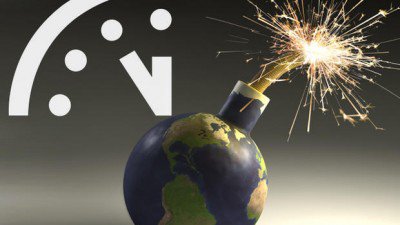Doomsday Clock Moves Closer to Midnight: The Most Perilous Time in World History

VISIT MY NEW WEB SITE:
Contact at [email protected].
The Bureau of the Atomic Scientists maintained its Doomsday Clock since 1947 – the closer to midnight, the greater the risk of catastrophe from nuclear war or environmental disaster.
Its original setting was seven minutes during a more peaceful time than what preceded or followed the clock’s launching.
It’s been set forward and backward numerous times, once to 17 minutes to midnight, two minutes to midnight the closest to what the Atomic Scientists perceive as a potential doomsday scenario.
It’s been there only twice – in 1953 during the height of Cold War fears, and as of January 25, 2018 – over fear of Trump’s hostility toward North Korea, Iran and other sovereign independent countries.
Days after his January 20, 2017 inauguration, the Doomsday Clock was advanced to two-and-a-half minutes to midnight, the move attributed to “the words of a single person: Donald Trump, the new President of the United States.”
The clock was moved less than a full minute for the first time because he’d only been president a few days.
The Atomic Scientists expressed concern over his announced nuclear arsenal expansion, his strident nationalism, his dismissiveness about climate change, his “intemperate statements,” and questionable appointments, potentially “ma(king) a bad international security situation worse.”
His actions during his early days in office were cause for concern – far more worrisome after a year as president, his administration infested with hawkish generals and neocon extremists.
His and their rage for war and hostility toward sovereign independent states risk unthinkable nuclear war on his watch – perhaps confrontation with Russia and/or China going nuclear by accident or design.
In announcing today’s move, Atomic Scientists (AC) president Rachel Bronson said
“(i)t’s with considerable concern that we set the Doomsday Clock, as of today. It is two minutes to midnight.”
AC board members, including 15 Nobel laureates, believe
“the world is not only more dangerous now than it was a year ago. It is as threatening as it has been since World War II.”
Nuclear history expert Alex Wellerstein explained today’s heightened fear, saying
“(w)e have members of Congress, White House advisers, and even the president implying that they think war with a nuclear state is not only likely, but potentially desirable. That’s unusual and disturbing.”
Proliferation of nuclear weapons and Washington’s willingness to use them perhaps threatens humanity like never before.
A single detonation can turn major cities into smoldering rubble, their populations annihilated, their landscape and surrounding areas irradiated.
In response to the Doomsday Clock’s advance toward midnight, International Campaign to Abolish Nuclear Weapons (ICAN) executive director Beatrice Fihn issued a statement, saying:
“The actions and policies of the nuclear-armed states are winding the Doomsday Clock towards midnight.”
“We have been lucky to avoid conflict through intentional or accidental means, but recent posturing and the false alarms in Hawaii and Japan show our luck is about to run out if we don’t move quickly.”
“(S)ecurity based on luck is reckless and foolish. It’s exactly what the nuclear states have now. 122 nations voted for the nuclear ban Treaty and other nations need to join the process so we can stop flirting with our own destruction and destroy the Doomsday Clock once and for all.”
Because of US rage for global dominance, today is the most perilous time in world history.
Humanity destroying nuclear war could happen by accident or design. US imperial madness could doom us all.
A Final Comment
On January 25, a Bulletin of the Atomic Scientists said the following:
“In 2017, world leaders failed to respond effectively to the looming threats of nuclear war and climate change, making the world security situation more dangerous than it was a year ago – and as dangerous as it has been since World War II.”
“The greatest risks last year arose in the nuclear realm. North Korea’s nuclear weapons program appeared to make remarkable progress in 2017, increasing risks for itself, other countries in the region, and the United States.”
“Hyperbolic rhetoric and provocative actions on both sides have increased the possibility of nuclear war by accident or miscalculation.”
“On the climate change front, the danger may seem less immediate, but avoiding catastrophic temperature increases in the long run requires urgent attention now…The nations of the world will have to significantly decrease their greenhouse gas emissions to keep climate risks manageable, and so far, the global response has fallen far short of meeting this challenge.”
“(T)here has also been a breakdown in the international order that has been dangerously exacerbated by recent US actions. In 2017, the United States backed away from its longstanding leadership role in the world, reducing its commitment to seek common ground and undermining the overall effort toward solving pressing global governance challenges.”
“Neither allies nor adversaries have been able to reliably predict US actions or understand when US pronouncements are real, and when they are mere rhetoric. International diplomacy has been reduced to name-calling, giving it a surrealistic sense of unreality that makes the world security situation ever more threatening.”
Atomic Scientists made levelheaded recommendations for stepping back from the brink – ways of saving humanity from possible annihilation.
Bipartisan lunatics in Washington reject peace and ecosanity. Their agenda poses a greater threat to humanity than during the second war to end all future ones.
They rage dangerously out-of-control today. New conflicts loom – risking destruction of life on planet earth if a way isn’t found to stop them.
*
Stephen Lendman is a Research Associate of the CRG, Correspondent of Global Research based in Chicago.
VISIT MY NEW WEB SITE: stephenlendman.org (Home – Stephen Lendman). Contact at [email protected].
My newest book as editor and contributor is titled “Flashpoint in Ukraine: How the US Drive for Hegemony Risks WW III.”

